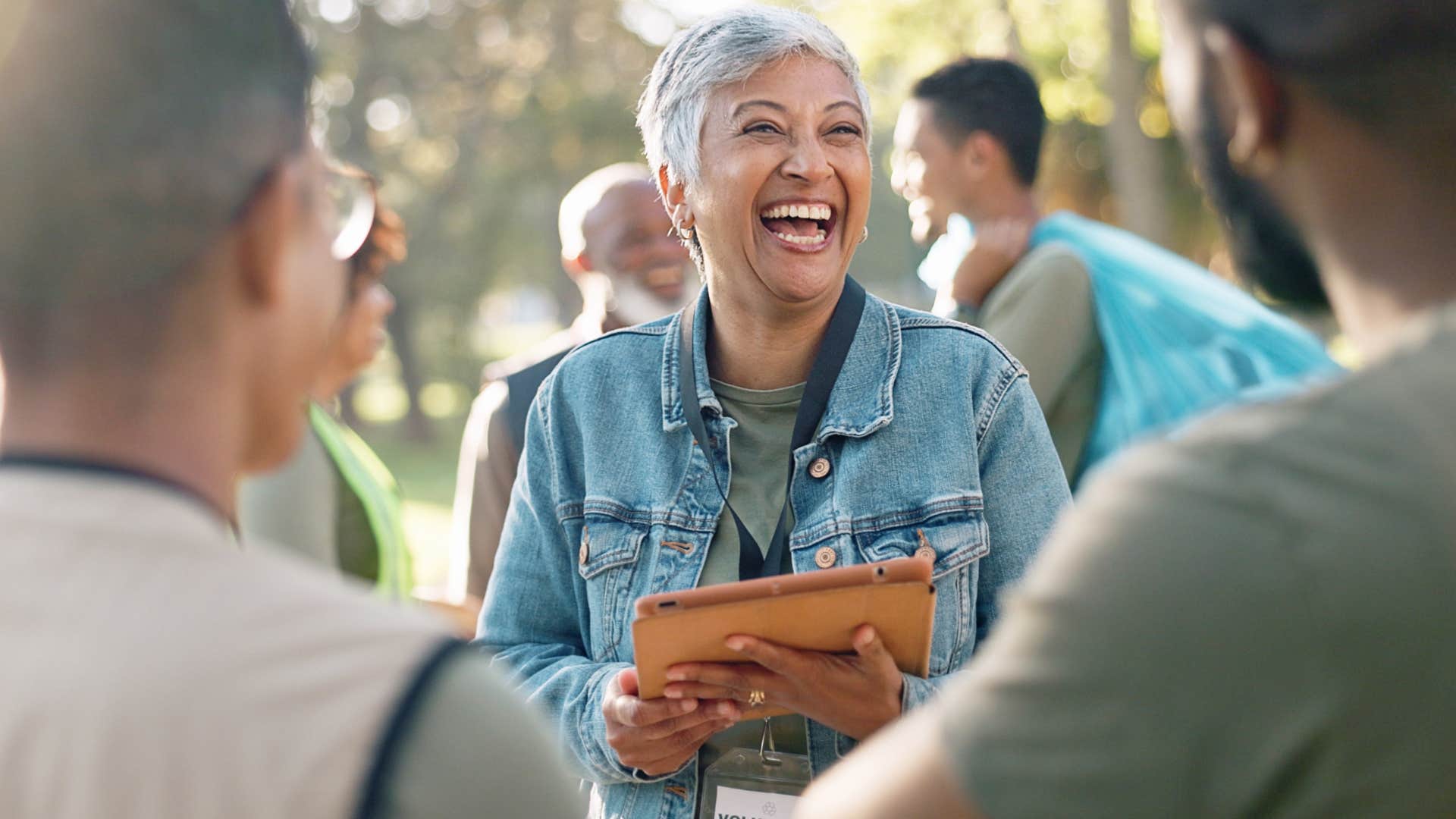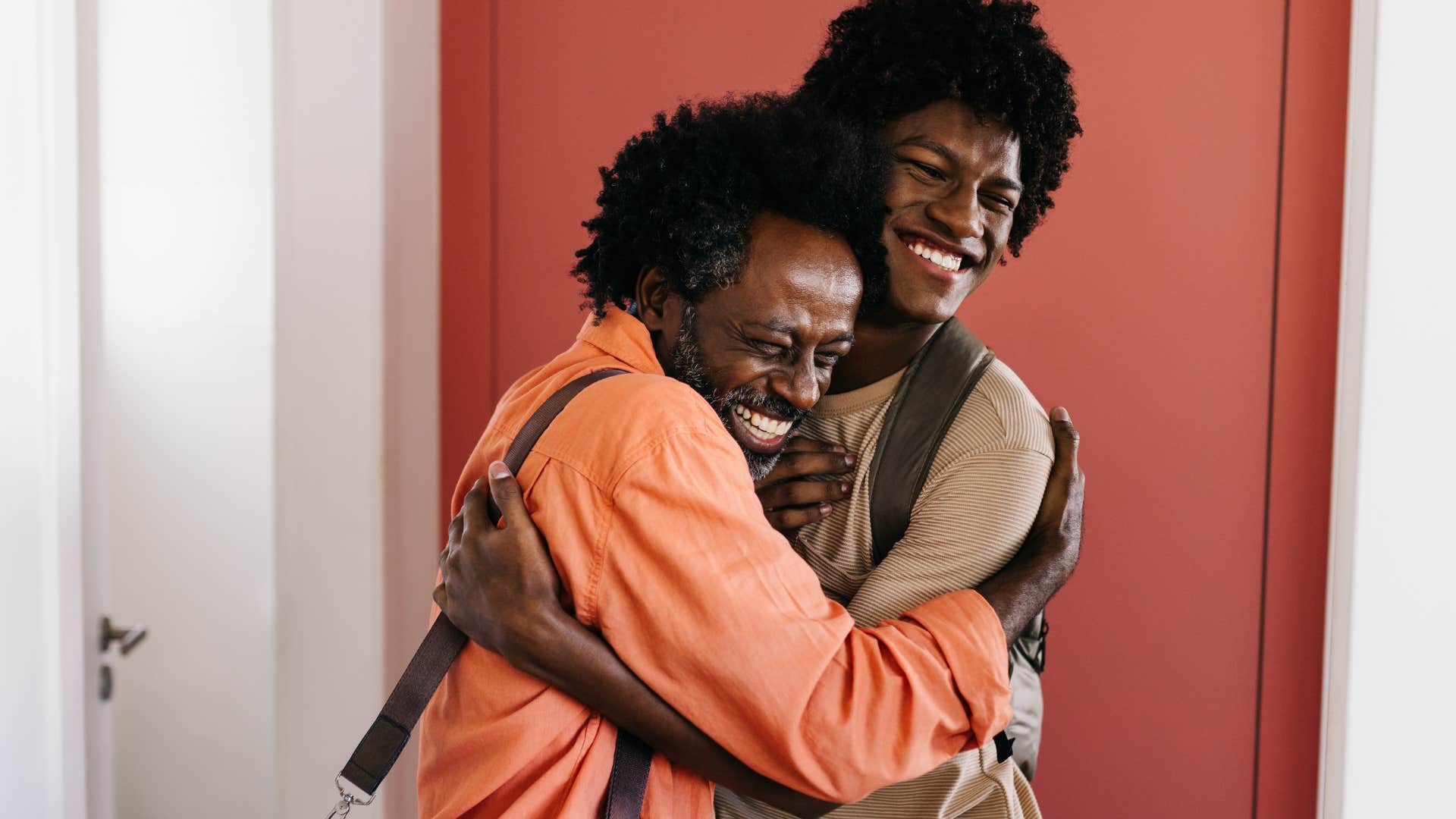Your Parents Raised You Right If You Still Say These 11 Phrases Most People Forgot
Are these phrases a part of your vocabulary on a daily basis?
 GBJSTOCK | Shutterstock
GBJSTOCK | Shutterstock Even if it seems unsuspecting, childhood experiences and parental influences play a huge role in crafting adult children's realities. From boosting their social skills, to teaching them independence, and even influencing their intimate relationships and professional careers, the parenting styles and priorities children grow up around make a big difference, at least according to a study from Children and Youth Services Review.
Even small things like a parent's word choice or the phrases they taught their kids can leave a lasting impact — teaching kids how to interact, communicate, and support others. In fact, your parents raised you right if you still say these phrases most people forget, not just because they're bonding and intimate, but because they help to promote respect, mutual understanding, and value.
Your parents raised you right if you still say these 11 phrases most people forgot
1. 'Please'
 PeopleImages.com - Yuri A | Shutterstock
PeopleImages.com - Yuri A | Shutterstock
Expressing gratitude is a practice that not only builds self-esteem and internal well-being, but also promotes healthier relationships and social connections, according to a 2010 study. However, other studies, like one from the Social Psychology Quarterly, suggest that phrases like "please" and "thank you" are less common across all generations than they were just a decade ago.
If your parents raised you right, chances are you still take the time to give thanks and use phrases like "please," even when you're making a simple request to a stranger or talking to co-workers in the office.
2. 'Do you need help?'
 Wayhome Studio | Shutterstock
Wayhome Studio | Shutterstock
While most people asking if other people need help and offering to people in their lives are doing it out of the kindness of their hearts — hoping to make a positive difference in someone else's life — a study from the American Journal of Public Health suggests that helping others also improves personal health and reduces stress.
So, your parents raised you right if you still say these phrases that most people forgot, not just because your relationships are more bountiful and supportive, but because you have practiced empathy in a way that boosts your well-being as well.
3. 'Thanks for your time'
 Amnaj Khetsamtip | Shutterstock
Amnaj Khetsamtip | Shutterstock
Whether you're in a work meeting or leaving a first date without a spark, a phrase like "thank you for your time" can make all of the difference. It not only reminds people that you're looking out for them, it's a way to express respect, even in uncomfortable or high-stress situations.
Conveying mutual respect in any kind of conversation or interaction is the key to promoting better productivity and connection. When people feel respected, they simultaneously feel valued and like "they belong" in whatever interaction they're indulging, according to a study from Social and Personality Psychology Compass.
4. 'Bless you'
 pics five | Shutterstock
pics five | Shutterstock
According to etiquette expert Maralee McKee, saying "bless you" when someone sneezes has become engrained in American culture — prompting a habit that's not only strange, but indicative of someone's respect and thoughtfulness.
Even if it seems silly — we don't acknowledge when someone burps — saying "bless you" and acknowledging someone else, even as a stranger in public, can bond people in unsuspecting ways. It's a reminder of our shared humanity, a way to look out for others and convey respect, even if it's entirely unsuspecting.
5. 'What can I bring?'
 Perfect Wave | Shutterstock
Perfect Wave | Shutterstock
Your parents raised you right if you still ask "What can I bring?" when someone invites you to a social event or their home. Outside of simply showing up for someone and taking action when they're struggling — never ask someone who's sick or grieving what they need, just show up with something that's low effort — a phrase like "What can I bring?" can truly cultivate bountiful relationships.
You're showing people that you care about them, showing up when it matters, and offering to make a contribution that some people are too self-centered to consider.
6. 'I don't know, but I'll find out'
 Dmytro Zinkevych | Shutterstock
Dmytro Zinkevych | Shutterstock
Having the confidence to make a mistake or try something you don't know how to do is brave enough, but being willing to seek out the answer for someone else when you're unsure is even more uncommon. Of course, being comfortable making mistakes and getting out of your comfort zone is largely a product of great parenting.
A warm parent who offers up guidance, acceptance, and empathy to their kids surrounding their mistakes and insecurities teaches them how to handle similar situations later in life. Rather than avoiding discomfort or growing shame around "not knowing," they embrace uncertainty, gaining opportunities and experience with a "growth mindset" that's becoming more and more uncommon.
7. 'I appreciate you'
 PeopleImages.com - Yuri A | Shutterstock
PeopleImages.com - Yuri A | Shutterstock
According to experts from Harvard Health, expressing gratitude and appreciation for other people, even in casual conversations or with strangers, can help to boost self-esteem, physical health, and general well-being. Even if you're simply making time to use a forgotten phrase like "I appreciate you" amid your daily life, you're making a difference.
Great parents teach their kids the importance of expressing gratitude in both small and large ways. They know that grateful and present kids will not only excel personally, but craft more meaningful connections and relationships.
8. 'Remind me of your name'
 fizkes | Shutterstock
fizkes | Shutterstock
According to a study from the Journal of Experimental Psychology: Applied, remembering someone's name and using it to address them in a conversation can promote positive feelings and bonding in a relationship.
It not only helps people to feel heard, but associates those positive feelings with the other person. So, if you not only make an effort to remember someone's name, but also ask them what it is, chances are your parents raised you right.
9. 'Drive safe'
 JLco Julia Amaral | Shutterstock
JLco Julia Amaral | Shutterstock
Oftentimes, in relationships and connections, it's the little things that matter the most. From offering up gratitude, to using phrases like "drive safe" when someone is leaving your home, to remembering their favorite coffee order, it's the little moments of sincerity that truly bonds people and spark positive memories.
In fact, engaging in one small act of kindness a week in social interactions or conversations can help to prevent loneliness and social isolation, according to a BYU study. So, parents who teach their kids — both by modeling kind behavior and teaching them the importance of empathy — that phrases like this are still important are setting them up for success.
10. 'Sorry, I didn't mean to interrupt'
 SG Shot | Shutterstock
SG Shot | Shutterstock
Even though many people are aware of the consequences of consistently interrupting someone in conversation, it's still one of the more common experiences everyone's dealt with in their social interactions. Whether they've accidentally interrupted someone else or been on the receiving end of unsatisfactory behavior, they know that it encourages people to feel unvalued and unheard.
However, we all make mistakes, and it's possible that people with the best of intentions will accidentally interrupt someone, which is why a phrase like "I didn't mean to interrupt" or "I'm sorry, keep going" can make a big difference. Great parents teach their kids to take accountability when they make a mistake, even if it's with phrases like this that most people forget are possible to use.
11. 'Let's agree to disagree'
 simona pilolla 2 | Shutterstock
simona pilolla 2 | Shutterstock
Not every conflict, argument, or conversation is going to end in a compromise or common ground, and people who were raised by great parents who encouraged emotional expression and open communication are okay with that.
They're secure enough to use a phrase like "I won't tolerate this kind of language" or even something like "let's agree to disagree" to protect a conversation from turning unproductive or rude.
Zayda Slabbekoorn is a staff writer with a bachelor's degree in social relations & policy and gender studies who focuses on psychology, relationships, self-help, and human interest stories.

